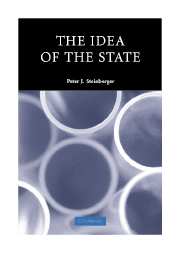Preface
Published online by Cambridge University Press: 22 September 2009
Summary
Historically, political philosophy has functioned largely – and also quite self-consciously – as a branch of philosophy per se, its propositions deeply embedded in and systematically underwritten by broader philosophical arguments and presumptions about how things in the world really are. This was certainly true of Plato and Aristotle, Cicero and Augustine, Aquinas, Hobbes and Hegel. In each such case, claims about politics and society reflected and were justified explicitly in terms of more fundamental claims of an ontological or metaphysical nature.
This kind of close connection seems no longer to exist. Political thought now purports to operate typically as a more or less independent enterprise, relatively unconnected to and unconstrained by larger traditions of systematic philosophical inquiry and reflecting, thereby, the sharp division of labor characteristic of contemporary academic life. Emblematic here is the well-known proposition that political speculation should indeed be “political, not metaphysical.” Such a proposition is embraced, explicitly or otherwise, not only by those engaged in the detailed analysis of liberal principles but also by those who operate within various traditions of what might be called literary prudence, as exemplified by the writings of, among others, Hannah Arendt and Michael Oakeshott.
Remarkably enough, this rejection of systematic metaphysical speculation in political theory has occurred precisely during an era in which philosophers – “analytic” and “continental” alike – have been deeply and increasingly preoccupied with metaphysical questions.
- Type
- Chapter
- Information
- The Idea of the State , pp. xi - xivPublisher: Cambridge University PressPrint publication year: 2005

